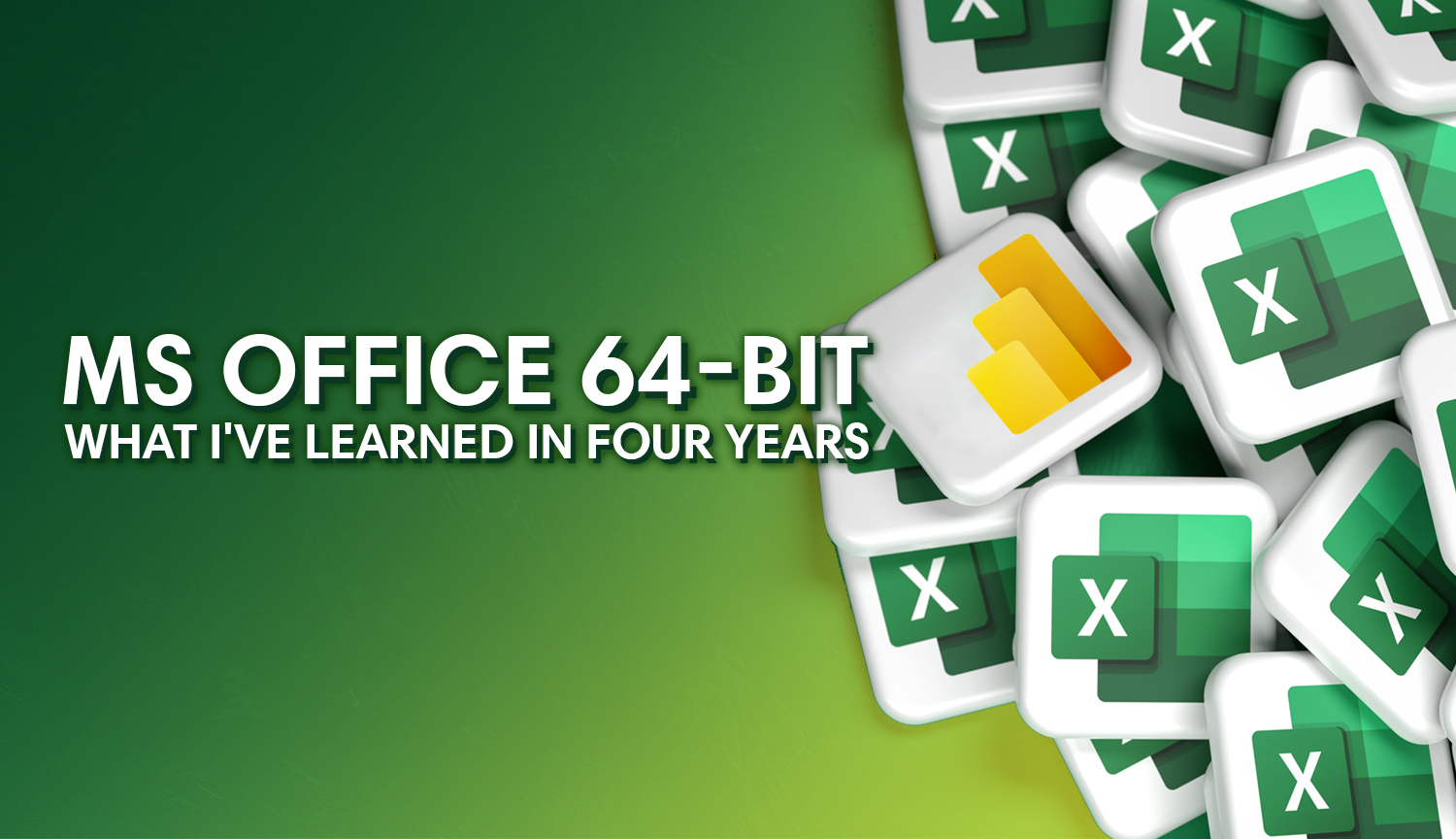What's up data gang? If you've been reading along throughout this journey, you'll realize that all of my posts have something in common (other than Excel...smartass), they all assume that you're already working with data...even if it's just cursory exposure. Well, every journey of a thousand worksheets begins with a single lookup, and hopefully, this story will help you position yourself to inner-join the fraternity of functions.
For the two of you who went out of the way to read our bios, you may have seen something interesting: I started out as a therapist...a job that does everything it can to avoid using hard data. You see, every clinician, no matter the discipline will tell you:
- The amount of paperwork that they need to complete is absolutely mind-boggling (in fact, I had more paperwork doing mental health counseling than I've ever had at my desk job...which is almost entirely paperwork).
- Clinicians will do anything within their power to avoid doing said paperwork.
- They hate their electronic medical records (not their particular program, but the very idea of having a system that makes things easier to track).
The issue with this Trifecta is that clinicians are paid and audited based on their notes, and as such, they've come up with the saying: "If you didn't write it, it didn't happen". With that being said, in every single clinical position I've ever held, I became the expert on our computer systems, as since I was young, I've always loved computers. As time went on, troubleshooting (or, let's be honest...just explaining over and over again to deaf ears) computer issues became one of my essential job duties. After "doing computers" became a fact of life, I was given access to our EMR's back-end (that is, where the data lives, as opposed to the front-end, which is what the user interacts with).
Upon viewing this back-end data, I was ASTOUNDED by how inefficient our notation was. Despite the fact that almost every clinician complained about having to do all their notes (and assessments), they were going out of their way to make documentation a more arduous process. It was at this moment that my origin story began, fixing these issues was akin to my parents being shot in front of me by Joe Chill.
One thing to note is that at this time, I had never even opened Excel (that's how disengaged the clinical world was from the "business" world), and I only had a cursory understanding of databases and spreadsheets, stemming from an AP computer science course that I took in High School (shout out to the rest of the Brooklyn Technites!), and to give you an idea of the time frame here, I was a year and change out of graduate school. Unfortunately, as I hear far too often, I was the victim of a string of horrifically bad math teachers that scared me away from anything that had to do with numbers all throughout college (interestingly, Greek letters I was just fine with...at the time, my brain didn't connect that physics and inorganic chemistry were math), so I made it all the way through grad school without ever taking a math class, let alone calculus (AP comp sci counts for an entire year of math...why I still thought I was bad at math now seems like lunacy).
Until, one faithful day I was given an interesting assignment at the very end of the day: I could use our EMR to run a report that included every patient we had that was given a specific test, but we needed a list of everyone who lacked this particular test. I told my company (which as far as nonprofit clinical agencies go, was actually fairly large) that I would see what I could do, and went home for the day.
That night, I DVR'ed the first season of Mr. Robot (I highly recommend season 1), a show about hacking. One thing I will say about the show is that it has quite possibly the ONLY realistic depiction of hacking in all of fiction...there's no warping into the machine to play a game of space invaders which unlocks the nastygram (read Batman vs. the Punisher to learn more about nastygrams), just the compiling of as much information as possible and then putting it all together, in fact, it illustrates that 90% of hacking is social engineering...which is why you should never give anyone your password (except me...of course). I then binged the entire first season that night and realized that I somehow understood the vast majority of the intricacies of the hack...almost like I spoke the same language.
I came into the office the next day and inspired by Mr. Robot, I asked a bunch of questions regarding the data that was available to us through the EMR, and I found out that in addition to getting the list of people who had the test, I could also get a list of everyone. Now, if another clinician got this far, they would realize that with these two pieces of data, you could sort alphabetically and then just see manually who of the 12,000 people on one list weren't on the other, and that could probably have been a part-time job for the rest of your days, but I remembered the mission: Efficiency, of which to manually count was anathema. I then tried several search terms in google consisting of "compare" and "list" and after the second try, I found a tutorial for Vlookups (the irony of my exclusive use of index match when I have VLookup to thank for my future career isn't lost on me) and got to work.
Now, with seasoned eyes, I realize that this is 12 seconds of work, write a quick index match and double click the lower right corner of the cell) but at this time I and more importantly my company (comprised entirely of Luddites) found it incredibly impressive and useful.
Imbued with a new sense of purpose, and the knowledge that I understood instructions on the internet, I then began my quest to make things more efficient for my colleagues...billing it as "if you use these tricks, you can see your patients for longer" (which by all means, is true). As trite as it is to say, I was honestly hoping to have the other clinicians work smarter...and not harder.
Throughout my time as both a "computer guy" and a clinician, I instituted a series of projects (think auto-populated note templates, productivity trackers, and a nifty tool that showed you only the people who you haven't seen in a given month so that you can call them), all of which I had the time to do because I too was using these tools to make myself more efficient. Once the time came when I had essentially automated my paperwork, my company began entrusting me with more data and kept coming up with increasingly complex problems to solve, until they realized that I was essentially building these tools full-time. It was at this point that I made the decision to ask if they could build an analyst position for me that would allow me to see all of our data, track it, trend it, and continue making new tools to help us hit our performance goals (we in the biz call these Key Performance Indicators: KPIs), and they accepted and I moved into my first data analyst job.
Once I had roughly a year under my belt, I could now begin applying to jobs with the data analyst skill set (who knew that the first thing to come to mind when you see "Therapist" isn't "computer nerd!?) and indeed although I stayed in Healthcare, I moved onto companies that had more robust data needs, and more tools I could use to do the job, and that's where I am today...all because I was inspired by a morphine-addicted sociopath who happened to also be a computer whiz.
So, why did I take the time to write this story? Despite how cocky I can get, even I'm not at the level where I think strangers on the internet would want to read my life story. No, I'm writing this as a general template for how you can leverage any existing skill set into a job working with data, by following a few simple guidelines:
- Math isn't a skill, it's a way of thinking. Despite believing that math wasn't for me, after essentially doing "math" for the last decade or so I realized that you don't need to be good at "arithmetic" (the actual solving of equations and rote calculation) in order to solve math problems, you just need to be the type of person who likes to find solutions and/or find flaws in things. There's a reason that statistically, math majors make the best Lawyers: both jobs are essentially about finding flaws, and patching over them (or using them to your advantage). If you're the type of person who, instead of giving up when faced with a problem, you try to find a solution, you're a math person...even if you don't know your times tables (like myself!).
- EVERY company can benefit from data, especially those that don't think they need to. If your company doesn't have a data team, then they're straight up leaving money on the table in terms of exponential increases in efficiency.
- The corollary to number 2 is that the less a company utilizes data to its advantage, the more impressive your small contribution will be. For example, I built my entire career on being the only person in my company who knew how to do a lookup (there were almost 5000 people at my company by the way). Use this to your advantage. One thing that's great about data is that it allows you to DIRECTLY show how you're adding value to your company.
- This is perhaps the most important lesson I can impart to you (and indeed, I impart it to my students as well...I'm still a counseling professor in my downtime): It's impossible to have all of the tools of the trade at your disposal at all times. One who has "mastered" their field (whatever their field may be) isn't the person who knows everything, it's the person who understands where to look, and how to apply these instructions. No computer programmer knows all of the functions and methods of a programming language off the top of their head, but they do know how to read the documentation, similarly, a doctor doesn't have every medication or condition memorized (at least, not after they've taken their Step-1) but they do know how to take test results and lookup the best cause of action. As such, when building your skills, focus on understanding the documentation, rather than trying to memorize all of the functions (because, as we've already covered, there are about 20,000 that you'll never use).
So, with those four concepts in mind, if you've been wanting to take the data plunge, I implore you to identify an area within your company or team that you know can be improved once the issue is identified, then be the person who identifies the issue, and see if you can fix it. You never know, a chef that can pivot out their ingredient list to cut costs and improve quality may be able to leverage that, and an HR person can see the time to hire for particular positions and focus attention on those jobs that are hard to fill, and even a stand-up comedian can quantify their laughs/joke and build their set that way.
Data is everywhere, you just need to learn to see it.
- Snacksfuscious
P.S. for my next post, I'm going to try something different. Did you know that by tweaking your computer a little bit, you can crunch numbers even faster? Next time on Adventures in Excel: Hardware.





